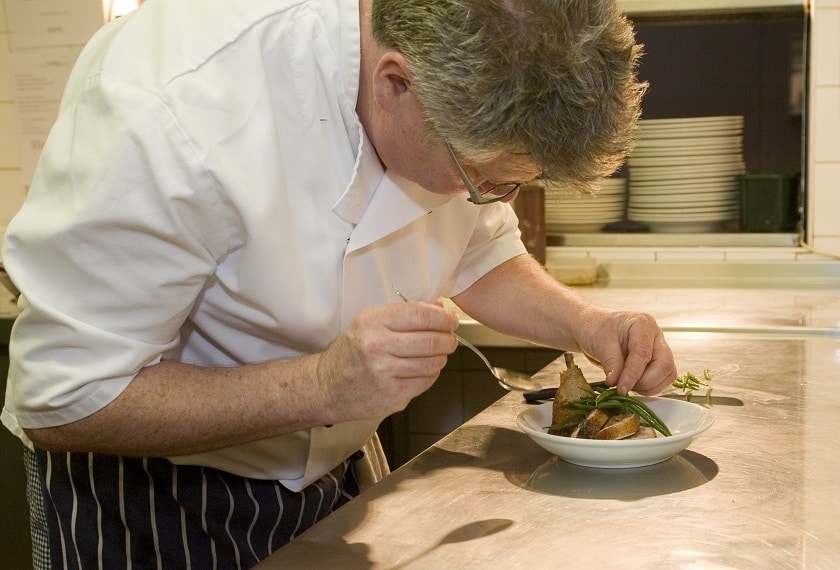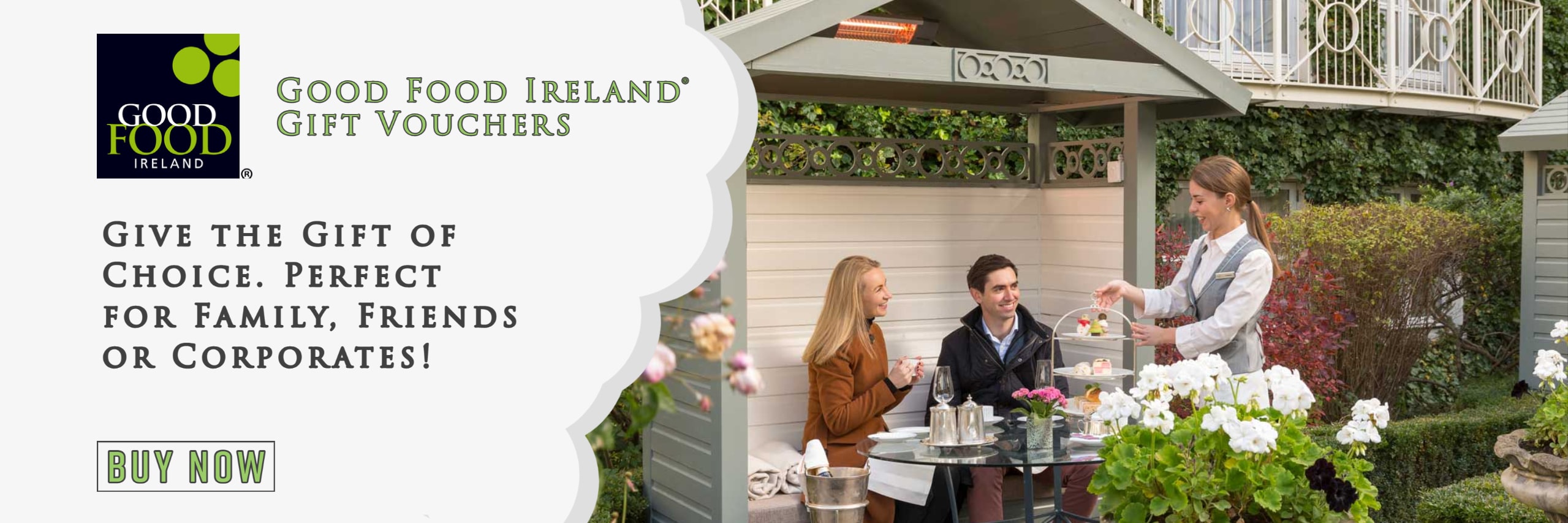
Paul Flynn, Head Chef, Owner and Patron, with my wife Maire, of The Tannery Restaurant in Dungarvan Co. Waterford. We opened the restaurant in 1997. We’ve since added to the business with The Tannery Townhouse accommodation and The Tannery Cookery School close by.
THE NITTY GRITTY
What type of training did you have?
I worked for ten years in London. I was Head Chef for Nico Ladenis aged just 23. I learned to cook hands-on mainly, with a year’s part-time college course. When I started in London, I was working in hotels, but furiously writing letters to all the good chefs including the Roux brothers and many other fine restaurants. I just wanted to get in at a high level. Hands-on experience at the highest level and travelling is the best way to learn for any chef. Before I opened The Tannery, I returned to Dublin to run the kitchen at La Stampa, a fantastic restaurant in Dawson Street. I was there for four years, and it was there I learned most about the business side of things. Read more on learning to cook.
What were the challenges along the way?
Challenges are never-ending! When we opened here, it was all about getting the food right. London was changing when I was there. You had Rowley Leigh at Kensington Place, and chefs like Simon Hopkinsondoing great things. That was that sort of food I wanted to do. I wanted to feel that kind of joy in the kitchen again. The biggest challenge was how do we manage this because we are a restaurant in a small seaside town. So we were quiet for a few years. You’re always subject to fluctuations and seasons in this setting. I get bored quite easily so that’s a bit of a challenge to make everything we do interesting and exciting.
Were there any major positives or crucial turning points in your career?
Setting up my own place was a massive turning point, from being an employed chef. With freedom came the responsibility! I suppose the biggest turning point in our success was when I got asked to do a column in The Irish Times. That made a massive difference to business because our profile started to build. I started writing about our lives here in this location, which has a soul and a heart. Maire works in front of the house, so I would write the column in longhand and she would type it up between services! Through that, we attracted great supporters like Tom Doorley. To maintain the continuing existence of your restaurant, you have to have a profile and the food writing created that for us, then the books and TV followed.
Which people influence your cooking?
I was hugely influenced in a lifestyle sense by Rick Stein. I admired him and thought ‘oh my God what a life he has!’ That made me want to come back to the country and have a restaurant! I’m an ambitious chef and always have been, and coming from the London/Dublin cookery scene I wanted to cook really good food here in this location and make it an enjoyable experience for all. It’s about making great food accessible for everyone.
Which food styles/trends interest you or influence your cooking as a professional chef?
We use Irish wherever we can, and a lot of seasonal stuff and local produce from the area here, so that influences my cooking most of all.
Why do you love your job as a professional chef?
When I was Head Chef with Nico Ladenis I ended up not loving my job at all. We worked so hard to get three Michelin stars, which we eventually got, but it was formulaic in many ways. I want to be able to decide what to cook and be seasonal. I now have a really good team so the whole process is really positive. It’s a sensational feeling to be doing stuff people admire.
Also, we’ve had a lot of people working here with us over the years. A lot of young chefs have passed through our hands. It’s been great to see them flourish in this environment. David Hurley and Mickael Viljanen both worked with me and both of them have gone on to great things. Fantastic people and great chefs. That’s a joy to see. We’ve also managed to produce three cookery books all about being Irish and using Irish food. My first was An Irish Adventure with Food, followed by Second Helpings and then Surf and Turf with Martin Shanahan, of Fishy Fishy in Kinsale, Co.Cork. Cooking should be at the heart of every home, an essential part of life.
What’s the worst thing about your role as a professional chef?
Whatever we do here has to be 100% creative, delicious and affordable. It’s not about bamboozling people. I like the simplicity of a recipe. But what you do can be taken apart, so you have to have pretty thick skin! You have to learn to become resilient and keep ploughing on!
Describe a typical day in the kitchen
There’s not really a typical day. I live by the calendar, so I have to ask Maire where I should be! There are days I could be off filming for TV. Or if I am here, I might be recipe testing for my consultancy work with Lidl in the mornings, so I go shopping for ingredients, then try to get a walk-in as well.
I brief the lads about 11 am usually. I’m fifty this year, so I have a Head Chef now, purely because it’s got to the stage where you bend down to put something in the oven and you’re wondering how you’re going to get up again, like a ‘who is going to rescue me here?’ moment! I like to pick up the girls from school and spend time with them between 3-5 pm. Then it’s back for evening service. I do end up still being on the pass in the evenings like any Head Chef, and nothing gets past me!
What are your strong points?
I’m very hardworking. I’m famously useless as a technician! But I can cook really well. These days I am happy to be known as a good cook and I really admire other good cooks like Nigel Slater and Yotam Ottolenghi. I’m persistent too. You have to be persistent to work in a restaurant kitchen for a living!
Would you change anything about your journey so far?
Well, it often hasn’t been an easy journey, especially the last 8 years with the recession. But I don’t know that I would change that. The recession makes you a better businessman. More inventive. We started our wine bar offering downstairs and utilised every bit of space we had to do business, whereas before it was used as a waiting space, with a couple of couches and stuff. And it’s fantastic to see people in the wine bar, enjoying a glass of wine and some nice simple food, creating a really great buzz. We probably wouldn’t have considered that aspect of the business before the recession.
Who does the cooking at home?
Sunday night is sacrosanct in our house. We always have dinner together, Maire, me and the girls. We really look forward to Sunday nights. Some great family food, a big fire, all of us together. It’s relaxing and heavenly. But my cookery efforts to impress my girls are continually spurned. It’s always ‘Granny does it better, or Mammy does it better.’ It’s like having two mini Fay Maschlers at the table! Fay Maschler has been the legendary restaurant critic on the London Evening Standard for years, and she’s still there!
Any advice for anyone who wants to become a professional chef?
You have to be hard working. Where you train is your university. If you train in a mediocre place, you’ll be a mediocre chef. Choose the highest level of restaurant you can. Once you get good training, you can decide what you want to do. You need a good apprenticeship first. After that, this job can be anything you want it to be, but the path you choose must speak to you. It’s not always about fine dining. If you want to open a daytime 9-5 cafe you can, once you can do everything really well and are prepared to make it the best.
It’s not always easy to be a chef. It’s a lifestyle more than a job. We are at odds with everyone else in that when they are off we are on, so you have to learn to not mind that. There is some great camaraderie among chefs because of the working hours. If you don’t love it, you’re in the wrong job. This is relentless graft, you have to be on time and on your feet all day. You really must love it. And love food books and travel. It’s really important to travel as part of learning.
What’s your favourite dish or recipe?
Cooking should be something everyone does at home. I feel strongly about that because it’s a very nurturing thing. So when we have our Sundays together, it will usually be something that just represents really good family cooking. Something like a slow-cooked short rib of beef. It’s a cut known as Jacob’s Ladder. I braise it slowly and serve with very soft creamy mashed potato and a salad. We had it the other Sunday at home and it was melting in the mouth. Every little morsel was just delicious. This cut of the rib of beef is not always easy to get. You won’t get it in a supermarket, so I would say use a Good Food Ireland butcher who should be able to cut a piece for you.

